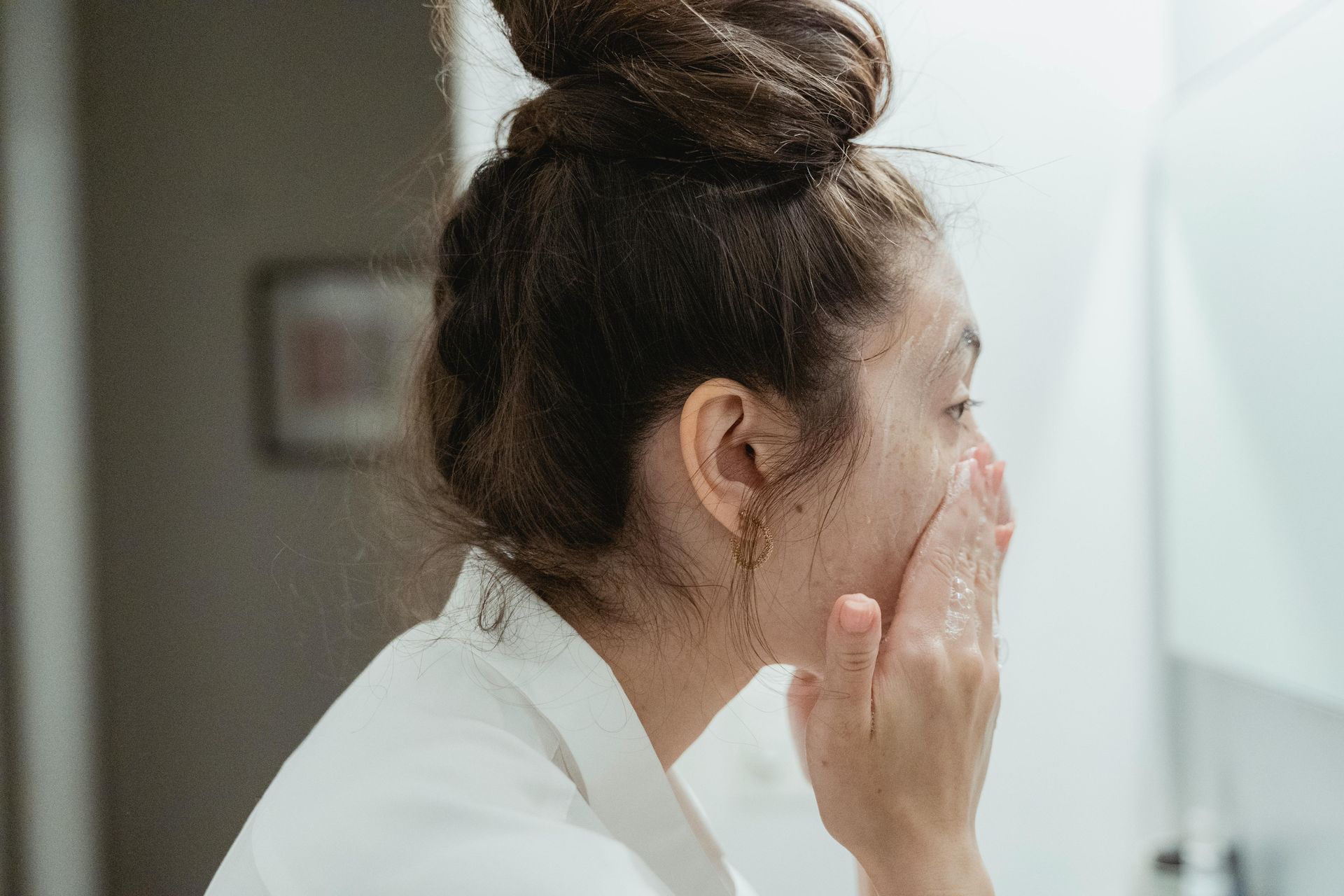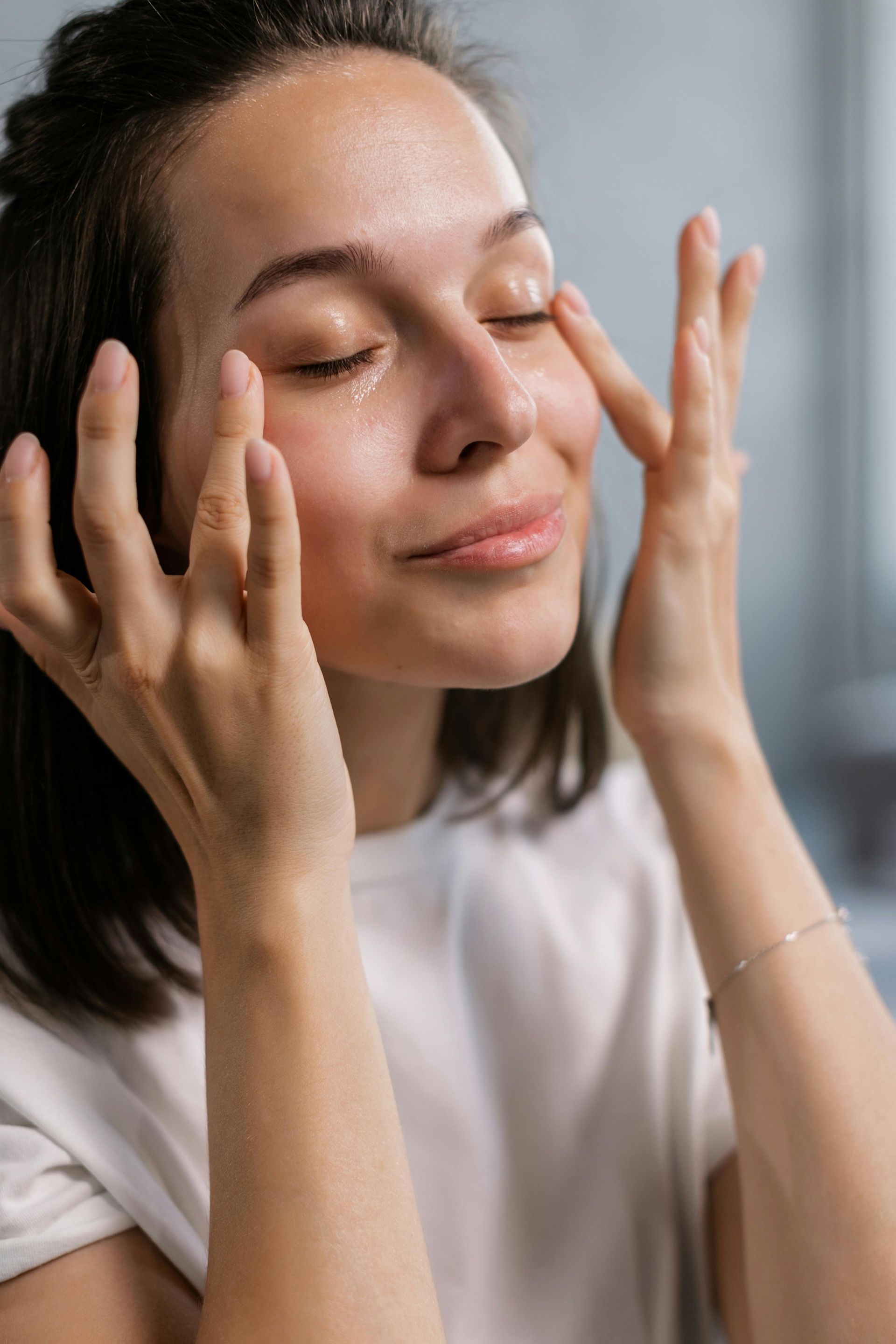Get your best skin this fall!
By Jennifer Spaulding, PharmD
October has arrived, we’ve passed the season of “fake fall” and the crisp breeze has entered the air. Time to pack up the beach bags and begin preparing our skin for the cooler winter months.
While we commonly associate summertime with the months of prioritizing skincare due to increased sun exposure and more revealing clothing, the fall and winter months are just as important in maintaining a healthy skincare routine. The skin is the largest organ in the human body and the first barrier against harmful organisms! A strong skincare routine throughout the whole year is vital to a healthy body.
Some best practices to ensure a healthy skincare routine as we enter the fall:
- Use a moisturizing cleanser. It is important to use a cleanser to wash your face, rather than simply water, to ensure that you are opening your pores and cleansing out bacteria that has accumulated throughout the day, to prevent acne and other types of breakouts. There are many cleansers on the market targeted for different skincare needs, and as air temperatures begin to decline and winds begin to pick up, ensure you are using a gentle moisturizing cleanser that is safe for your skin. Use lukewarm water to assist in opening your pores without causing damage through harsh temperatures and your skin will thank you!
- Minimize use of certain harsher skincare agents such as salicylic acid and retinoids, unless you have specific skin conditions. Salicylic acid can get deep into pores and help unclog them by removing sebum and other oils that can lead to breakouts, so it can be useful for people who are prone to blackheads and whiteheads.
Products with retinoid are commonly used to treat acne, acne scars, dark spots, large pores, melasma (patchy areas that are brown to gray-brown), psoriasis (a noncontagious autoimmune disease), stretch marks, and wrinkles. However, using retinoid can have undesirable side effects. Our pharmacists can guide you in its use, including during pregnancy or breastfeeding. - Look for certain skincare agents for specific reasons. For example, hyaluronic acid helps bind water to collagen (a structural protein in our skin), thus trapping water in the skin and making it look healthier. Our bodies naturally produce hyaluronic acid, but unfortunately, the production decreases with age.
Another popular anti-aging ingredient is glycolic acid. It is a strong exfoliant which, if used long-term, can boost collagen production. Collagen provides structure and strength to our skin, and again unfortunately, our bodies' natural collagen production decreases with age. It is recommended to start slowly with glycolic acid and ramp up over time if there is no irritation.
Ascorbic acid, also known as the antioxidant vitamin C, helps to fight off free radicals* and is another ingredient found in skincare products. The buildup of free radicals can cause wrinkles, sunspots, and other signs of aging.
Azelaic acid, a gentler ingredient than the facial acids mentioned above, can help to clear redness, rosacea (skin condition of the face that causes flushing or long-term redness), and melasma, and even out skin tone. It is a better choice for people with sensitive skin or for people who are pregnant.

- Apply a moisturizer to your body every day. Your skin is the first barrier that external organisms must pass through when attempting to enter your body. If your skin is well hydrated, it becomes more difficult to permeate, thus less penetrable to harmful micro bacteria and viruses. Although your skin may be covered from the elements by clothing, it is still permeable to air and the skin is one of the primary means by which moisture can leave your body. To prevent dehydration, be sure to provide a moisturizer or lotion to your body daily all throughout the year, but especially during the winter when the external elements and dropping temperatures lead to dehydration.
- Increase water intake! Water represents 60-75% of the human body at different stages of the human life. Hydration is therefore necessary to healthy skin. Studies have shown that maintaining a higher intake of water outside of water consumed through dietary means leads to a healthier skin barrier, which we have already established can lead to decreased permeation of harmful bacterial agents and viruses. Maintaining a hydrated skin barrier can also decrease the appearance of fine lines and wrinkles.
- Always apply sunscreen. Although summertime is over, UV (ultra-violet) exposure can still reach damaging levels throughout the fall and winter months. A daily moisturizer with sunscreen will protect your skin from sun damage. Remember, UV radiation can cause DNA damage, leading to other undesirable conditions.
- Lifestyle choices can help. Avoiding tanning beds and not smoking can help keep your skin healthy and not speed up the aging process.
When trying products new to you, consider testing just a little bit of one product at a time on a small area, to ensure that they don't cause irritation or an undesired reaction or result. Also, keep in mind that it might take your skin some time to adjust to a new regimen and that it could take several weeks before results can be seen. Each person's skin is different!
Drop by The Pharmacy and visit with one of our pharmacists about their preferred products to help protect your skin this fall! We can also help with interpreting ingredients lists.
We have an expanded selection of skincare products that we would be happy to help you select from!
*antioxidants are compounds that can counteract unstable molecules called free radicals, which can damage DNA, cell membranes, and other parts of cells.
References and Resources:
American Academy of Dermatology Association
https://www.aad.org/public/everyday-care/skin-care-basics/care/winter-skin-survival-kit
United States Environmental Protection Agency
https://www.epa.gov/sunsafety/sun-safety-monthly-average-uv-index-2006-2023
Cleveland Clinic
https://my.clevelandclinic.org/health/body/10978-skin
Waccamaw Dermatology
https://waccamawdermatology.com/why-you-shouldnt-skip-retinol-this-winter/
Apollo Dermatologu
https://apollodermclinic.com/moisturizers-the-importance-of-moisturizing-as-the-weather-gets-colder/
Harvard Health on antioxidants and free radicals
https://www.health.harvard.edu/staying-healthy/understanding-antioxidants
National Library of Medicine on dietary water affecting skin
https://pmc.ncbi.nlm.nih.gov/articles/PMC4529263/
MDPI on the impact of lifestyle on skin hydration
https://www.mdpi.com/2079-9284/11/1/13
American Academy of Dermatology
https://www.aad.org/public/everyday-care/skin-care-basics/care
Cleveland Clinic
https://health.clevelandclinic.org/guide-to-facial-acids
Cleveland Clinic
https://my.clevelandclinic.org/health/treatments/23293-retinol
Mayo Clinic on the skin (this is a great interview with a dermatologist that covers a lot of information about our skin, products, new technologies, etc. For example, they "myth bust" the ingredient named plant stem cells, which come from the stem of the plant, rather than the stem cells of the plant!)





